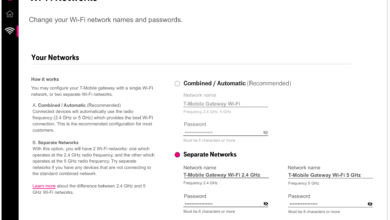T-Mobile Home Internet IPv6: What You Need to Know

In today’s world, internet connectivity is an essential part of our daily lives. Whether you’re streaming your favorite shows, working from home, or gaming online, having a reliable and fast internet connection is crucial.
T-Mobile has emerged as one of the leaders in offering home internet services, and with the increasing demand for faster, more efficient internet protocols, they’ve embraced IPv6 technology for improved service.
If you’re considering T-Mobile Home Internet or are already a customer, understanding T-Mobile Home Internet IPv6 can help optimize your network experience.
This article will explain what IPv6 is, why it matters for home internet, and how T-Mobile is utilizing this protocol to enhance your internet service.
What is IPv6 and Why Does It Matter?
The Basics of IPv6
IPv6 (Internet Protocol version 6) is the latest version of the Internet Protocol that governs how devices communicate over the Internet.
It was developed to replace IPv4, the previous version, which is running out of available addresses due to the rapid growth of connected devices worldwide.
IPv4, which uses 32-bit addresses, allows for approximately 4.3 billion unique IP addresses. However, as more devices connect to the internet, this number is insufficient.
IPv6, on the other hand, uses 128-bit addresses, allowing for approximately 340 undecillion unique addresses — a nearly infinite number that can accommodate the growing number of internet-connected devices.
Key Benefits of IPv6
- Larger Address Space: As mentioned, IPv6 provides a massive increase in the number of available IP addresses, ensuring that there will be enough addresses for years to come.
- Improved Security: IPv6 comes with built-in security features, such as IPsec (Internet Protocol Security), which is mandatory for all IPv6-enabled devices, providing enhanced encryption and authentication.
- Better Performance: With IPv6, the routing process becomes more efficient, reducing the number of network hops and improving overall speed.
- Simplified Network Configuration: IPv6 simplifies network management with automatic address configuration, making it easier for users to connect to the internet.
How Does T-Mobile Use IPv6?
T-Mobile, a leading provider of home internet services, has integrated IPv6 technology to improve the reliability and speed of its home internet service.
By using IPv6, T-Mobile can offer faster and more secure connections, reduce network congestion, and future-proof its internet service.
IPv6 on T-Mobile Home Internet ensures that customers receive a smooth, uninterrupted online experience, even as the number of connected devices increases.
This is especially important as more households adopt smart home devices, streaming services, and other internet-connected technologies.
How Does IPv6 Enhance T-Mobile Home Internet?
1. Faster and More Efficient Connections
T-Mobile’s home internet service benefits from IPv6’s enhanced routing capabilities. IPv6 packets are more efficient than IPv4 packets, allowing for faster data transmission across the network.
With T-Mobile Home Internet IPv6, the routing tables are streamlined, and data travels more directly from point A to point B, improving connection speeds.
2. Future-Proofing Internet Access
As the number of connected devices continues to grow, IPv6 ensures that T-Mobile’s home internet infrastructure remains scalable.
With IPv4, many devices are forced to use techniques like NAT (Network Address Translation), which can lead to complications when devices need to communicate.
With IPv6, each device can have its unique IP address, eliminating these issues and providing better support for emerging technologies.
3. Improved Security Features
Security is a critical concern in today’s connected world. IPv6 has built-in support for IPsec, a protocol designed to secure internet communications by encrypting data between devices.
With T-Mobile Home Internet IPv6, customers benefit from these enhanced security measures without needing additional software or configuration.
4. Better Support for IoT Devices
As smart homes and the Internet of Things (IoT) become more prevalent, IPv6 becomes crucial. IoT devices often require their unique IP addresses to communicate effectively, and IPv6 provides an almost unlimited number of addresses to support these devices.
T-Mobile’s integration of IPv6 into their home internet service makes it ideal for households with numerous smart devices, offering seamless communication and fewer connection issues.
Does T-Mobile Home Internet IPv6 Impact My Wi-Fi Experience?
The Role of Routers and Modems
For T-Mobile customers, it’s important to ensure that their home networking equipment is compatible with IPv6. Most modern routers and modems support IPv6, but it’s always a good idea to check the specifications to ensure full compatibility with T-Mobile Home Internet IPv6.
T-Mobile provides customers with routers that are designed to work with IPv6, which ensures that the benefits of the new protocol are realized across all connected devices.
What Does This Mean for T-Mobile Customers?
For those with T-Mobile Home Internet, the move to IPv6 means:
- Faster speeds when browsing the web, streaming, or gaming.
- Reduced latency, especially in online gaming or video conferencing.
- Improved network reliability, especially as more devices are connected to the internet.
- Simpler setup and better network configuration without the need for additional software.
How to Enable IPv6 on T-Mobile Home Internet
For most T-Mobile customers, IPv6 is enabled by default when using the service. However, if you want to make sure that your network is using IPv6 or to troubleshoot any issues, you can check the settings on your router or modem.
Here’s a general guide to enabling or verifying IPv6 on your T-Mobile Home Internet:
- Log into Your Router: Open your browser and enter the router’s IP address (typically
192.168.1.1or192.168.0.1). - Access the Settings: Use the admin credentials to log in to your router settings.
- Check IPv6 Settings: Locate the IPv6 settings section in the router’s menu. Ensure that IPv6 is enabled.
- Test Your IPv6 Connection: Once enabled, you can test your IPv6 connection by visiting websites like test-ipv6.com to see if your IP address is detected as IPv6.
If you encounter any difficulties, T-Mobile’s customer support is available to assist with troubleshooting and ensuring that your home internet is working optimally with IPv6.
FAQs About T-Mobile Home Internet IPv6
1. What is the main difference between IPv4 and IPv6?
The primary difference is the number of available IP addresses. IPv4 supports around 4.3 billion addresses, while IPv6 can accommodate an almost unlimited number of unique addresses. IPv6 also includes enhanced security and routing features.
2. Will IPv6 slow down my internet?
No, in most cases, IPv6 will improve internet speeds due to more efficient routing. However, the actual speed of your T-Mobile Home Internet depends on various factors such as network congestion, device performance, and the quality of your Wi-Fi connection.
3. Can I still use IPv4 with T-Mobile Home Internet?
Yes, T-Mobile Home Internet supports both IPv4 and IPv6. However, IPv6 offers better performance and scalability for modern devices and applications.
4. Do I need to upgrade my router for IPv6?
If you are using a recent model, your router should already support IPv6. If not, you may need to upgrade to a newer router that is compatible with IPv6. T-Mobile offers compatible routers with its service.
5. What are the benefits of using IPv6 for smart home devices?
IPv6 provides each device with a unique IP address, eliminating the need for NAT and allowing seamless communication between IoT devices in a smart home. This results in better performance and fewer connection issues.
Conclusion
As T-Mobile Home Internet continues to expand, the integration of IPv6 plays a key role in ensuring that users experience faster, more secure, and more efficient connections.
Whether you’re a casual browser, a gamer, or a smart home enthusiast, IPv6 will improve the overall quality of your internet service.
By embracing this new protocol, T-Mobile is paving the way for a more connected future, where your devices can communicate seamlessly and securely.
So, if you’re looking for a reliable home internet service, T-Mobile Home Internet IPv6 is a powerful option that can offer improved speed, security, and support for the growing number of connected devices in your home. For more Home Internet information check the nowinternet.




